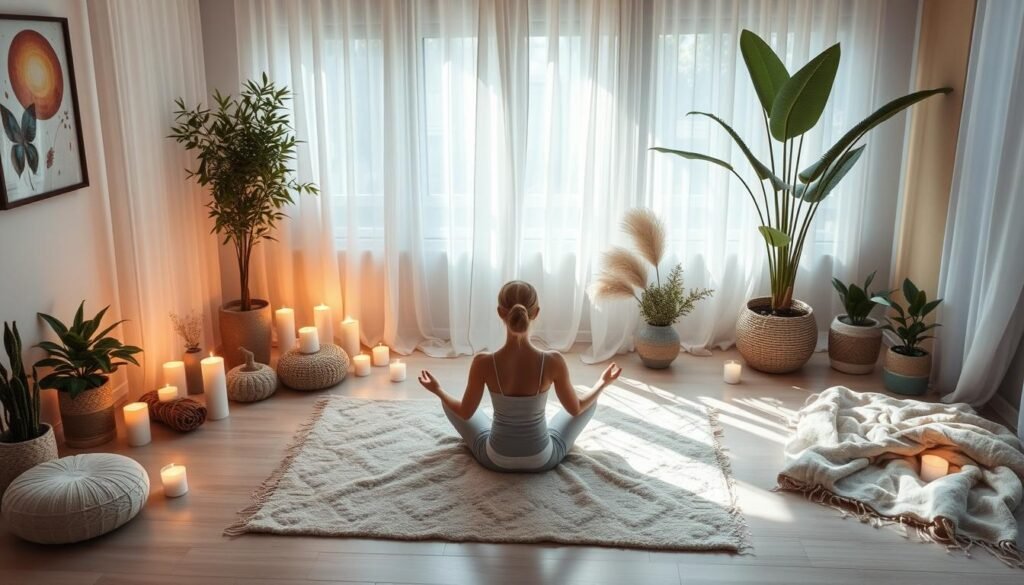Did you know more than 43% of people feel chronically tired because of anxiety? This shocking fact shows how closely anxiety and fatigue are linked. They greatly affect our daily lives. The World Health Organization even calls burnout a workplace issue. This shows how important it is for our health and mental well-being.
It’s key to understand the connection between anxiety and fatigue to find relief. Many suffer from symptoms that make it hard to work or enjoy life. By knowing how stress affects us and learning to deal with it, we can feel better. This way, we can improve our mental health and feel less tired.
Different mental wellness resources suggest using natural ways to fight anxiety. Changing our lifestyle can also really help our energy and mental state. This piece talks about how to tackle both anxiety and fatigue. It gives helpful tips for feeling more alive again.
Key Takeaways
- Chronic fatigue affects over 43% of individuals, often linked to anxiety.
- Burnout is recognized as a phenomenon impacting workplace health by the World Health Organization.
- Practical solutions can significantly improve mental wellness and reduce feelings of exhaustion.
- Integrating natural remedies for anxiety can help boost energy levels.
- Coping strategies are essential for managing anxiety and fatigue effectively.
Understanding Anxiety: The Connection to Fatigue
About 31% of U.S adults face anxiety disorders at some point. Symptoms include a fast heart rate, quick breathing, and feeling restless. Many people with anxiety also feel very tired and exhausted. This shows how anxiety and fatigue are connected. Being stressed often can make you feel tired because anxiety keeps you very alert.
Research tells us that anxiety can make our bodies release stress hormones like cortisol more than normal. This process needs a lot of energy and can make you feel tired. In fact, 40% of people with anxiety say they often feel fatigued. Anxiety can also mess up how well you sleep, affecting your energy and health.
It’s crucial to find ways to deal with these issues. Cognitive Behavioral Therapy (CBT) has helped reduce anxiety for 50-60% of people. The CDC says doing exercises regularly can also fight fatigue and support your mental health. Working out for 150 minutes a week has big benefits for managing anxiety.
Understanding the link between anxiety and fatigue shows why we must see anxiety as a complex problem. Using both psychological and physical ways to support mental health can make life better for those impacted. For deeper insights, you can read up on the genetic and environmental factors of anxiety through studies like those found here.
| Factor | Connection to Anxiety | Impact on Fatigue |
|---|---|---|
| Stress Hormones | Elevated levels due to chronic anxiety | Increased energy demands leading to fatigue |
| Sleep Disturbances | Commonly associated with anxiety disorders | Contributes to persistent tiredness |
| Cognitive Behavioral Therapy | Effective in reducing anxiety symptoms | Improves energy levels through symptom management |
| Regular Physical Activity | Recommended by health authorities | Can lead to improvements in fatigue |
Anxiety and Fatigue: Common Symptoms Explored
Many people deal with the tough duo of anxiety and fatigue. Knowing the symptoms of anxiety can help spot them. Symptoms include restlessness, irritability, and trouble focusing. Every person’s experience with these conditions is unique.
The link between fatigue symptoms and anxiety is strong. Chronic anxiety puts the body in a constant “fight-or-flight” mode. This results in anxiety and fatigue symptoms like muscle tension and mental fog. Sleep problems are common, making the fatigue and mental health worse.
Table 1 shows different fatigue symptoms that come with anxiety disorders. It helps understand the various ways symptoms can appear:
| Symptom | Description |
|---|---|
| Restlessness | An inability to relax, leading to physical fidgeting or pacing. |
| Trouble Concentrating | Hard time focusing or keeping attention due to anxious thoughts. |
| Irritability | More sensitive to stress, causing mood swings and frustration. |
| Fatigue | Deep tiredness that rest doesn’t fix, often from anxiety. |
| Muscle Tension | Continual tightness or pain in muscles from stress caused by anxiety. |
Being aware of these symptoms helps people recognize their struggles. It encourages them to get the right support. This way, they can tackle anxiety and fatigue better, leading to improved health.
10 Natural Strategies for Effective Anxiety Management
Many adults in the U.S. struggle with anxiety. Nearly 20% face anxiety disorders every year. It’s key to find natural ways to manage this. Methods like being active, watching alcohol intake, and good sleep help a lot. These approaches can lessen symptoms and boost your well-being.
Stay Active to Combat Anxiety
Exercise is great for keeping anxiety at bay. Getting at least 150 minutes of activity like walking each week helps a lot. It cuts anxiety symptoms by up to 40%. Things like cycling and swimming are good options. They make the body release endorphins, lifting your mood.
Limit Alcohol for Better Mental Health
Drinking might feel like it helps, but it can make anxiety worse. Cutting back on alcohol is good for your mental health. Even though drinks are common at get-togethers, drinking less is beneficial. Looking for other ways to relax is key for anxiety management.
The Importance of Sleep Hygiene
Good sleep is vital for handling anxiety well. Keeping a regular sleep schedule reduces anxiety by 40%. Setting a bedtime routine and cutting down on caffeine helps. Also, getting sunlight in the day improves sleep and mental health.
If sleep problems continue, seek expert advice. This may include checking for sleep disorders. There’s a strong link between rest and managing anxiety. To learn more about natural anxiety relief and sleep, check out this resource.
Holistic Approaches to Anxiety Relief
Holistic approaches treat the mind and body together. They aim to improve well-being and balance. This can greatly help with anxiety. Meditation and mindfulness are especially popular. They are known for helping people relax and manage their emotions.
Meditation and Mindfulness Techniques
Meditation is a strong tool for fighting anxiety. It helps people become more aware and present. Regularly meditating can make anxiety levels go down. There are many methods like guided meditation and body scans. They all focus on breathing and living in the moment. These practices can quiet anxious thoughts.
A 2023 study showed mindfulness-based programs help with anxiety. It proves integrating these techniques into mental health care is useful.
Deep Breathing Exercises for Instant Calm
Deep breathing is an easy way to calm down quickly. It shifts your focus from stress. This change brings instant relief. Techniques like breathing in through the nose and out through the mouth work well. They lessen anxiety’s physical signs. Making deep breathing part of daily life helps maintain emotional steadiness. This makes it key in holistic anxiety strategies.

Stress Management Techniques that Work
Managing stress well is key to feeling better overall. Adding stress-busting activities to your day can help if you’re anxious. Techniques like relaxation exercises are good for this. Deep breathing and making your muscles relax can lower stress in your body and improve how you feel. These methods really work if you keep at them.
One study looked at 185 university students. It found doing aerobic exercise twice a week made them feel less stressed. Being active not just keeps you fit; it’s also great for beating stress. Yoga is another good option. It helps calm stress and anxiety by affecting your nervous system. It might even help lower cortisol, which is a stress hormone, and reduce blood pressure.
What you eat can also affect how stressed you feel. A study in 2022 showed eating a lot of processed food can make stress worse. It’s important to watch what you eat and keep caffeine under 400 mg a day. Also, spending too much time on screens or with your smartphone can increase stress. Cutting down on these can improve your mental health.
Expressive writing is a useful therapy too. It helps people feel better and take care of themselves, especially with ongoing health issues. Making these stress management techniques part of your life can help you feel healthier and happier.
Nutrition Matters: Eating for Mental Wellness
Nutrition is key for mental health. It affects mood, thinking, and overall happiness. Eating a balanced diet for anxiety can really help with symptoms and emotional balance. Adding foods full of nutrients to your meals boosts mental health. It also keeps your energy up all day.
Nutrient-Dense Diet for Stable Mood
Eating foods full of nutrients is important for a stable mood. Eating regularly helps avoid mood swings from low blood sugar. This is a problem for people who miss meals. Research shows about half of them feel moodier.
To stay balanced, eat plenty of whole grains, fruits, and veggies. They help keep your energy and mood consistent.
- Healthy fats, particularly omega-3s in fish like salmon and sardines, are crucial. Not having enough may raise the risk of mood problems by 20%.
- Foods rich in protein help keep your mood steady. They can cut mood issues by 25%.
- High fiber and probiotics boost gut health. This improves the mood of 70% of people who try it.
The Role of Hydration in Mental Health
Being well-hydrated is key for mental health. Even slight dehydration can mess with your mind and mood. Losing just 2% of your body weight in fluids has effects. Drinking enough water supports brain chemicals, linking hydration and mental health.
- Too much caffeine can cause more anxiety for 60% of people drinking over 400 mg a day.
- Exercising and eating well boost mental health, improving anxiety by 25%.
- Socializing during meals makes us happier. It can make you feel 40% better overall.

| Nutrient | Source | Benefit |
|---|---|---|
| Omega-3 Fatty Acids | Fish (salmon, sardines) | Reduces risk of mood disorders |
| Protein | Poultry, legumes | Stabilizes mood and energy |
| Fiber | Whole grains, fruits | Improves gut health and mood |
| Water | Fluids | Supports cognitive function |
Energy-Boosting Tips to Reduce Fatigue
Many people feel tired because of stress and not sleeping enough. Adding tips to boost energy can change how you feel each day. Eating healthy snacks often and taking short naps are good ways to fight off tiredness. These steps can help you feel more energetic and mentally sharp.
Healthy Snack Choices for an Energy Boost
Eat regular meals and healthy snacks every 3 to 4 hours to keep your energy steady. Choose snacks that give long-lasting energy instead of ones with lots of sugar that make you crash. Some top snack picks include:
- Nuts and seeds for healthy fats and protein
- Fruits like bananas or apples for quick energy
- Yogurt with berries for probiotics and vitamins
- Whole grain crackers with hummus for fiber
Staying hydrated is also key. Drinking water can boost your energy, especially after working out. Not drinking enough water can make you feel tired and affect how well you think and perform. Eating foods rich in vitamin B12 is important too, as not getting enough can make you feel weak and tired.
Strategic Napping: When and How
Taking short naps can quickly make you feel less tired. Studies show that naps of different lengths can help your brain work better. A short nap of 15 to 20 minutes can refresh you for the rest of the day. If you’re really pushing yourself, a longer nap of 1.5 hours might help, allowing for a full sleep cycle. This can lift your mood and fight fatigue.
Having a nap routine helps a lot, along with sleeping and waking up at the same times every day. Adding these tips to your day can help you beat tiredness and improve your mental health.
| Healthy Snack Choices | Benefits |
|---|---|
| Nuts and seeds | Rich in healthy fats and protein, help sustain energy |
| Fruits (e.g., bananas, apples) | Quick source of natural sugars and energizing vitamins |
| Yogurt with berries | Provides probiotics, vitamins, and antioxidants |
| Whole grain crackers with hummus | Delivers fiber and protein for satiety and steady energy |
| Water | Essential for hydration and improving cognitive performance |
Mindfulness Techniques for Fatigue Relief
Fatigue can really slow you down in your day-to-day life. Using mindfulness techniques is a powerful way to fight back. Mindful walking and body scans help us reconnect with our environment and bodies. This often leads to a big drop in fatigue.
Practicing mindfulness boosts self-awareness and helps us focus on the now. Studies show that doing this every day can sharpen our attention. It also cuts down on emotional drain. People who take part in mindfulness programs often enjoy better sleep and less stress. Both are key to kicking fatigue to the curb.

- Mindful Walking: While walking, really notice your surroundings. Pay attention to how your body feels and your breathing.
- Body Scans: Take a few minutes to mentally check different parts of your body. Recognize any tight spots and relax them.
- Outdoor Mindfulness: Being mindful outdoors has extra perks over doing it inside. Research backs this up.
- Establish a Routine: Stick with mindfulness exercises every day for six months. This will help you feel the full benefits over time.
Adding mindfulness techniques to your life does more than ease fatigue. It also builds your strength against daily worries. By spending time on these practices, you can live a more vibrant and balanced life.
Coping Strategies for Anxiety in Daily Life
Managing anxiety every day is key. It involves using practical coping strategies that fit into daily routines. Setting small, achievable goals helps overcome the feeling of being overwhelmed. Breaking big tasks into simpler steps is a smart move. It helps you make progress and builds your confidence.
Talking about your feelings is another important step. When you share your thoughts with friends or family, you get solid support. This sharing makes you feel less alone. It brings a sense of connection and understanding.
Having a strong support network is crucial for handling everyday life. Joining groups or online communities offers a place to share experiences. This helps in building resilience. You also get motivated and view things from new perspectives.
Self-care is essential for feeling good. Activities like walking or yoga can really lower anxiety. Studies have found that exercise improves both mood and anxiety levels. Moreover, practicing mindfulness or meditation can cut anxiety symptoms by 10-30%.
What you eat also impacts your mental health. Foods rich in omega-3 fatty acids, like salmon, and complex carbs are good for your mood. Drinking enough water is important too, as even slight dehydration can increase anxiety. Cutting back on caffeine and alcohol helps stabilize your emotions.
Using these strategies can really help deal with anxiety. Adding holistic practices to your life is good for your emotions and overall health. Here’s a quick summary of effective strategies to remember:
| Strategy | Description | Benefits |
|---|---|---|
| Set Achievable Goals | Break tasks into smaller steps | Boosts confidence and reduces overwhelm |
| Open Communication | Share feelings with loved ones | Provides support and reduces isolation |
| Build a Support Network | Connect with groups or communities | Encourages motivation and resilience |
| Engage in Physical Activities | Incorporate exercise into daily life | Reduces anxiety and boosts mood |
| Practice Mindfulness | Daily meditation or mindfulness exercises | Enhances emotional regulation and awareness |
| Maintain a Balanced Diet | Focus on omega-3s and complex carbs | Promotes stable mood and energy levels |
Seeking Mental Health Support: When to Reach Out
Up to 18% of Americans struggle with anxiety disorders, the most common mental issue. Knowing when to get help can make life better. Long-lasting symptoms that disrupt daily life mean it’s time to see a professional.
Many signs suggest the need for mental health support. Symptoms like feeling short of breath, dizzy, and very tired are common. Anxious thoughts may involve seeing things in black and white or worrying a lot. Avoiding places and repetitive actions also show a need for help.
It’s key to tackle anxiety early. If ignored, symptoms can get worse, making it harder to recover. Cognitive Behavioral Therapy (CBT) is a proven way to deal with anxiety. It helps people handle their fears. Medicines may also help, especially with CBT.
There are many resources for mental health. Sadly, about half of adults with mental issues don’t get help. This might be because they don’t know where to find support. It’s vital to know the signs of anxiety and to reach out for help.
Having people to support you is important for recovery. Going to therapy feels easier with a friend or family member. Getting help through therapy or support groups is a step toward less anxiety and better health.
Conclusion
The link between anxiety and fatigue is vital, especially during hard times like the COVID-19 crisis. Many people, notably those on haemodialysis, feel tired, anxious, and sleep poorly. It’s crucial we understand these issues and their effects on our well-being.
We’ve talked about ways to handle anxiety and fatigue. Keeping active and eating well are natural steps. Getting help from professionals is also key. By using these methods, we can improve our mental health and wellness.
For anyone dealing with anxiety and fatigue, remember, it’s a continuous battle. Keep trying new ways to ease these feelings, with support from others. For more info, check out studies like this one in scientific literature. It shows the importance of tackling these issues fully.